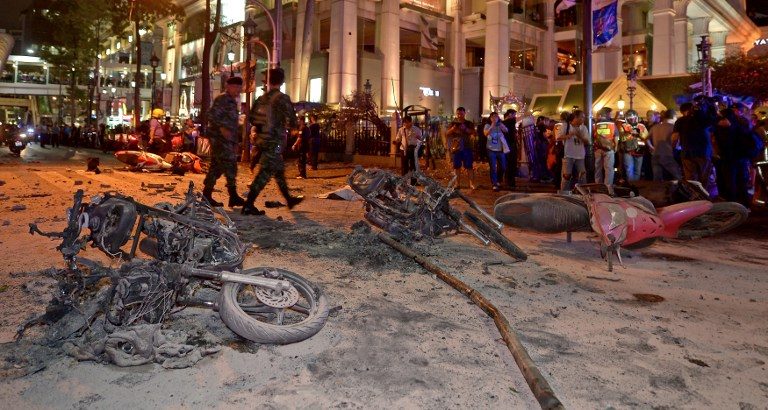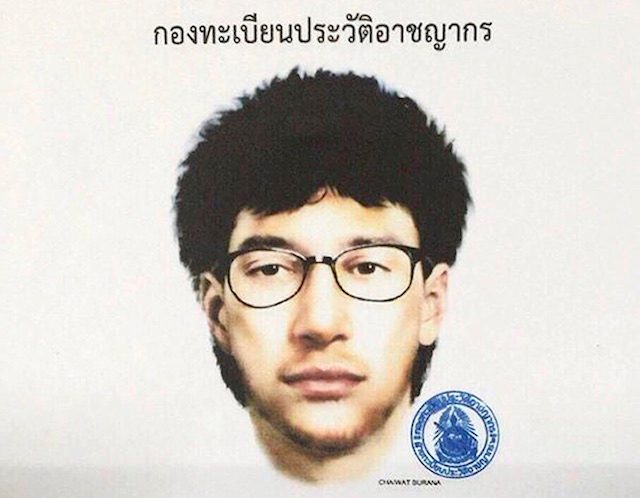SUMMARY
This is AI generated summarization, which may have errors. For context, always refer to the full article.

BANGKOK, Thailand – Confusion swirls around who carried out Bangkok‘s deadly bombing. But experts say the unprecedented scale of the Monday, August 17, attack and apparent targeting of tourists could indicate a game-changing escalation of tactics for the country’s usual suspects – or an entirely new threat.
Here is what we know so far about investigations into the blast, which killed 20 people and wounded more than 100 at a crowded Hindu shrine in the Thai capital.
What are the Thai authorities saying?
Thai police say a man believed to be a foreigner planted the bomb, he was spart of a network of more than 10 people, and that Interpol will be asked for help in gathering information from abroad.
But a spokesman for Thailand’s ruling junta said separately that global terror organizations were not suspected, adding to days of sometimes contradictory information from authorities.
Who planted the bomb?

Police suspect a dark-haired man in a yellow shirt who is seen in grainy security footage casually walking into the shrine and leaving a backpack believed to contain the bomb under a bench.
Authorities are looking for two other men seen standing in front of the main suspect, possible to shield him, as he planted the bag.
The yellow-shirted man is seen leaving the shrine while looking at his smartphone, then leaving on a motorcycle taxi, police said.
A sketch portrayed him with dark-rimmed glasses, a full head of dark hair. Police described the man as tall and fair-skinned.
Authorities say he was overheard speaking a “foreign language, not English.” Ethnicity, however, is difficult to determine from the sketch or the footage.
When asked about his ethnicity, police spokesman Prawut Thavornsiri used a Thai phrase to describe light-skinned Muslims from South Asia, Central Asia and the Middle East.
But various senior Thai security figures have repeatedly given contradictory information about the suspect, with some also saying he may be European, or part-Thai.
Who might have been behind this?
None of Thailand’s militant or political actors have ever carried out such a brazen, apparently well-planned, and deadly attack before, puzzling experts and raising concern of a new and dangerous paradigm.
“Whatever the identity or motive of the perpetrators, the reality is that a threshold has been crossed, and Thai politics and society will likely take a radically different course in the months, and possibly years, to come,” anti-terror expert Joseph Liow of the Brookings Institution wrote in an essay.
Some of the groups facing suspicion:
Thailand’s rival political forces
Bangkok has endured a decade of deadly political violence related to the power struggle between the military – backed by the capital’s middle class and elite and a rural and urban poor loyal to ousted populist former premiers Yingluck and Thaksin Shinawatra.
But experts say neither side had much to gain by launching a bloody attack on innocents at a shrine revered by Thais.
“It is inconceivable to me that any Thai political group, however extreme, would pull off a job like this,” said Anthony Davis, a security analyst with IHS Jane’s.
Muslim insurgents
Rebels are waging a longtime, deadly insurgency for greater autonomy in southern Thailand’s three Muslim-majority states bordering Malaysia.
Despite regular bombings there, experts say a massive attack in Bangkok doesn’t fit the modus operandi of rebel groups long content to fight the battle close to home, and who generally target Thai police.
Recent peace contacts, however, have not led to full talks with a Thai military viewed by rebels with suspicion.
Frustration could be rising in younger militants, said terrorism analyst Rohan Gunaratna.
“If it was people from the south of Thailand, that means the landscape has changed dramatically because it would mean the conflict expanded from the south,” Gunaratna said, but he added that so far nothing indicated involvement from the insurgents.
Uighurs
Some Thai media outlets have suggested the involvement of militants from China’s Muslim ethnic Uighur minority or their co-religious sympathisers, after Thailand last month forcibly repatriated more than 100 Uighur refugees to uncertain fates in China.
Uighurs complain of Chinese oppression and have stepped up a domestic campaign of violence – usually with knife assaults – but are not known to have ever carried out an attack outside China, or anything as sophisticated as the Erawan blast.
Islamic State/Katibah Nusantara
The Islamic State has made it clear it wishes to export its jihad or inspire militant attacks outside of its base in Iraq and Syria, and security experts say it formed a Malay-speaking Southeast Asian unit called Katibah Nusantara for this purpose.
Experts have warned of the possibility of the group – which envisions establishing a Southeast Asian hardline caliphate – eventually staging violent attacks.
It has purportedly recruited hundreds of Indonesians and Malaysians.
“Clearly a group like that has the motivation and the military skills and capability and bomb-making techniques for this,” said Davis of IHS Jane’s, though he cautions there is as yet nothing suggesting the group’s involvement.
Islamic State attacks are usually followed by fiery claims of responsibility. Davis said new actors like Katibah could bring new approaches, and that keeping quiet could be a tactic to sow confusion and fear.
Other Southeast Asian militants
Various Southeast Asian Islamic militant groups have carried out deadly attacks in other parts of the region in the past, including one in Bali in 2002 that killed 202 people.
But the groups considered the biggest threats – such as Jemaah Islamiyah (JI) are considered to be largely de-fanged by crackdowns, and never made Thailand a prime target.
Someone with an anti-China grudge
The attack on a shrine known to draw large numbers of Chinese tourists – in a country where China is the largest source of visitor arrivals – has fueled unconfirmed speculation of a possible anti-China angle.
Thai military junta spokesman Colonel Winthai Suvaree said on Thursday: “Chinese people were not the direct target.” – Rappler.com
Add a comment
How does this make you feel?
There are no comments yet. Add your comment to start the conversation.